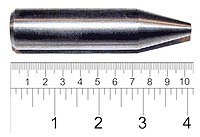Stakalloy

Stakalloy is a ternary alloy of uranium composed of vanadium, niobium, and depleted uranium.[1] The alloy was developed in 2002 by Michael R. Staker of Loyola University Maryland under grant from the United States Army.[2]
Composition
[edit]The niobium content of stakalloy is between 0.01 and 0.95 percent by weight and the balance being uranium.[1] The vanadium content of the alloy is between the gamma eutectoid and the eutectic compositions, 1.0 percent and 4.5 percent by weight respectively.[1]
Properties
[edit]Stakalloy has improved metallurgical properties over other depleted uranium alloys, such as staballoy, being more viable as a structural alloy where a combination between high strength and high density is required.[1] Changes include that of density, hardness, ballistic properties, and machinability.[1]
Production
[edit]
Staker's invention of stakalloy involved reducing excessive carbon levels while adding together uranium with trace amounts of niobium and vanadium.[1] The three constituent parts may be combined through melting, however, the niobium and vanadium must be charged into the melt or introduced to additional melt stock before heat-up.[1]
Arc melting is also a melting technique noted by Staker, in which niobium is added to an alloy of vanadium and uranium from a crucible.[1]
After casting an ingot of stakalloy, the ingot can be used in the as-cast condition or be worked—either hot or cold—to change both properties and shape. Stakalloy can also be heat-treated after manipulation of shape.
Uses
[edit]
Stakalloy may be a viable replacement for the United States Army's Advanced Kinetic Energy round.[3] In 2007, Army Solicitation Notice W911QX-07-T-0053 entitled "Processing U-V-X Alloy Ingots" outlined work at Aerojet producing promising alloys with interesting material properties for future testing at the Army Research Laboratories.[3][4]
References
[edit]- ^ a b c d e f g h i US 6726876, Staker, Michael R., "Stakalloy: a uranium-vanadium-niobium alloy", published 2004-04-27, assigned to Secretary of the United States Army
- ^ "Michael R. Staker Inventions, Patents and Patent Applications - Justia Patents Search". patents.justia.com. Retrieved 2023-04-17.
- ^ a b Hambling, David. "Army Again Turns to Depleted Uranium for New Weaponry". Wired. ISSN 1059-1028. Retrieved 2023-04-17.
- ^ "PRESOL | R | PROCESSING U-V-X ALLOY INGOTS | 08-Mar-07 - FBO#1928". www.fbodaily.com. Retrieved 2023-04-17.
